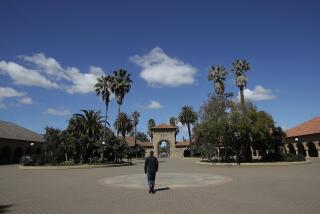Judge Allows Scholarships Limited to Black Students
ANNAPOLIS, Md. — A scholarship program limited to black students at the University of Maryland is constitutional because of the school’s history of racial discrimination, a judge ruled Thursday.
U.S. District Judge Frederick J. Motz rejected arguments by senior Daniel Podbresky that his constitutional rights were violated because he could not apply for the scholarship even though he was academically qualified. He sued in 1990.
“At bottom, the only damage . . . is the insult to his sensibilities caused by the continuation of a program which he believes to be wrong in principle,” Motz said.
The judge said the university proved that the effects of past discrimination continue today and that many black students, parents and counselors believe that blacks are not welcome at the main campus in College Park.
The Benjamin Banneker Program, named after the 19th-Century black scientist and inventor from Ellicott City, Md., awards about $800,000 in scholarships each year to 80 or more academically gifted black students at the campus. The four-year scholarships cover tuition, books, room and board.
The scholarships amount to just 1% of the total financial aid in the university’s budget and are “designed to remedy the effects of past injustices to African Americans without interfering with the rights of others in the process,” Motz said.
To justify the scholarship program, the university was put in the unusual position of arguing in court that it has not overcome the effects of its history of discrimination against blacks.
Richard Samp, Podbresky’s lawyer, said he will appeal. “The Supreme Court has made it clear that this type of discrimination is to be permitted only in very rare circumstances,” he said.
Motz had upheld the scholarship program in an earlier ruling on the basis it was needed because of the university’s history of discrimination.
But his decision was reversed by an appeals panel, which said the program could be upheld only if the effect of past discrimination was still being felt today.
More to Read
Sign up for Essential California
The most important California stories and recommendations in your inbox every morning.
You may occasionally receive promotional content from the Los Angeles Times.










